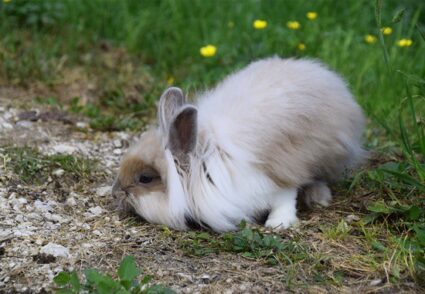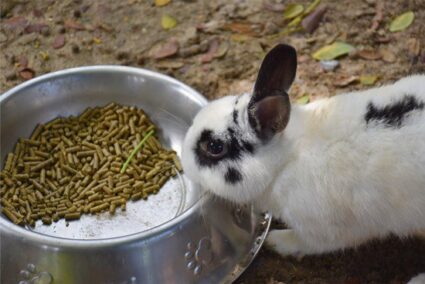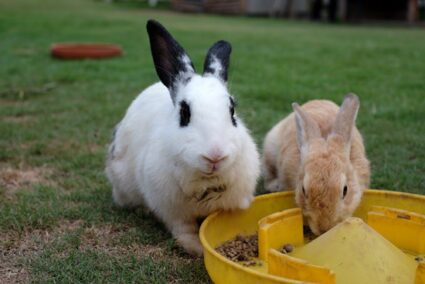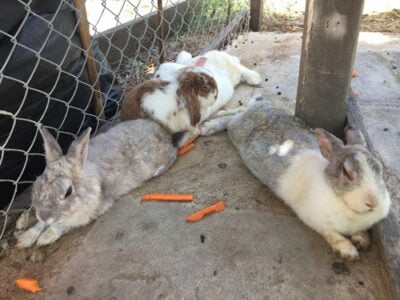Rabbits poop a lot due to their fiber-rich diet. But we don’t tend to take much notice until a rabbit stops pooping altogether. If she’s not pooping at all, then you have a constipated rabbit.
Remove dry food from her hutch and encourage more exercise. A teaspoon of olive oil could get her bowels moving. If that doesn’t work, your vet can give your rabbit a laxative or enema.
Rabbit constipation mustn’t be permitted to last for longer than 24 hours. It suggests that your rabbit has an intestinal blockage. She needs help to get her bowels moving again.
Do Rabbits Get Constipated?
Constipation in rabbits can be dangerous. If a rabbit does not eliminate, she is at risk of developing an intestinal blockage. It’s a result of feces hardening inside a rabbit’s digestive tract. Aside from little-to-no droppings being found in your pet’s hutch, symptoms can include:
- Refuses to eat. Your rabbit is incapable of fitting any more solid food into her stomach. Until she passes feces, her intestines are clogged.
- Swollen and distended stomach. A digestive blockage means that food piles up. This will be visible to the naked eye when you look at your rabbit’s belly.
- Signs of being in pain. These involve doubling over and grinding her teeth. Constipation is painful for rabbits. Your pet will not be able to hide her discomfort.
Constipation can be avoided by ensuring your rabbit eats enough hay. Hay is full of fiber. If she bypasses hay in favor of other solid food, your rabbit will become constipated.
Another common explanation for constipation is swallowing excess fur — rabbits groom near-constantly. During shedding season, your rabbit will pull out more fur. If she eats this, it could cause an internal blockage.
How Often Should Rabbits Poop?
The average healthy rabbit can produce up to 300 poops per day.
Do not worry if this sounds like far more feces than your rabbit ever produces. The fact is, you won’t see all of these poop pellets. Rabbits are clean animals. It’s likely that your pet will eliminate in a private, unseen part of her hutch.
Also, rabbits eat some of their own feces. These are known as cecotropes, and rabbits use them to gain nutrients. Cecotropes are typically a source of protein and Vitamin D for rabbits.
How Do I Know if My Rabbit’s Poop is Healthy?
Perhaps more important than the quantity of rabbit poop is the quality. You should be able to differentiate between healthy and unhealthy rabbit poop. Here’s how:
- Rabbit poop looks like a small, round pellet. This should be around the size of a frozen pea.
- If the poop is small or misshapen, your pet may have a partial blockage in her gut.
- The poop should be a light shade of brown. Darker poops suggest an excess of protein. Consider reducing your pet’s food pellets and increasing her hay. It’s not a problem if your rabbit stops eating pellets.
- While fresh, a rabbit poop should be firm and stable. If you roll it between your fingers, though, the poop should easily grind into a fine powder. This suggests a healthy gut.
- You should not find two or three poop pellets attached. If this is the case, it suggests that your rabbit is experiencing slow digestion. You should give her a rabbit-friendly probiotic.
Don’t worry if your pet’s poops are linked with hair. This just means that your rabbit is safely processing any swallowed fur.

How Long Can a Rabbit Go Without Pooping?
Rabbits poop with great frequency. Don’t be surprised if you see your rabbit eliminating every time she eats hay. Rabbits like to have something to chew on while they poop.
This means that any prolonged period without elimination is a warning sign. Keep a close eye on your rabbit. If she has not pooped in 24 hours, see a vet.
This goes double if your rabbit is also not eating. These are symptoms of gastrointestinal stasis, which the University of Miami calls, “The Silent Killer.” Even an otherwise-healthy rabbit will not survive for long with this condition.
Check your rabbit’s hutch and litter tray for poops daily. Rabbits like to poop in soft places.
How To Help a Rabbit with Constipation
If you believe that your rabbit’s constipation is temporary, you have two options.
- Offer your rabbit a small dosage of a laxative.
- Physically stimulate your rabbit into pooping.
Which of these techniques you adopt really depends on how severe your rabbit’s constipation is.
What is a Safe Laxative for Rabbits?
It’s always advisable to get some rabbit laxatives. Ask a store employee for advice.
If it’s not an option, or you prefer a natural approach, consider olive oil. This is the only time that you should ever give olive oil to a rabbit. When constipated, it will help to get her bowels moving again.
Olive oil is packed with fat. This means that, when consumed to excess, it can cause diarrhea. This means you’ll still need to be careful. Don’t switch one problem with your pet’s bowels for another.
Fed in small doses, olive oil can encourage your rabbit to poop. Stick to just one teaspoon. If you do not see results in a few hours, do not feed again. That will place your rabbit at risk.

How to Physically Encourage a Rabbit to Poop
Build a rabbit obstacle course and encourage your rabbit to run around. This will get her digestive tract moving again. The more cardio she does, the faster your pet will relieve herself.
Even if she doesn’t poop immediately upon returning to her hutch, your rabbit will be thirsty. This means she’ll drink plenty of water. This will soften up any hard feces.
Take away pellets and other solid foods, too. Your rabbit will likely want a post-exercise snack, and hay is ideal. All that fiber, on top of the physical movement and water, will help no end.
Run a cotton ball under warm water and rubbing it on your rabbit’s genitals. This will likely only work for young rabbits. You are imitating the sensation of being licked. This is how a mother rabbit encourages her babies to relieve themselves. Your pet’s body will undergo a reflex reaction.
Foods That Cause Constipation in Rabbits
A rabbit’s diet is key to ensuring that she does not become constipated. Your rabbit needs to eat plenty of hay. This should comprise around 80% of her daily calorific intake.
Timothy, meadow, and grass hay are all high in fiber. Alfalfa hay contains more protein. As well as being fattening, this could clog up your rabbit. Avoid Alfalfa hay in adult pets.
You’ll also need to watch how much dry food your rabbit is eating. Green, leafy vegetables are essential to rabbits. Go easy on starchy vegetables like cauliflower and broccoli, though, as these foods take longer to digest.
Never give your rabbit foods that are particularly high in starch. Bread or potatoes will cause almost immediate constipation. If eaten to excess, these foods can kill a healthy rabbit overnight. Rabbit digestion cannot cope with them.
Typically, a rabbit that eats plenty of hay and drinks water regularly will be fine. Sometimes, though, the ingestion of fur can affect even the healthiest rabbit diet. Watch how much hair your rabbit swallows while grooming.
This is vital during heavy shedding seasons. When spring arrives, rabbits lose the majority of their fur. This is natural. Your pet will try to cool off by removing this herself, though.
This can lead to swallowing large amounts of hair, potentially causing constipation. Step up your rabbit’s grooming regime during these times and clean her hutch regularly.
Conditions That Cause Rabbit Constipation
It’s not just your rabbit’s diet that could lead to constipation. There could also be a medical diagnosis that explains your pet’s pooping problem.
We have discussed the dangers of rabbit bloating and constipation already. These are symptoms of an intestinal blockage. This occurs when a rabbit eats too much. She cannot digest her food, and thus cannot poop.
Most rabbits will not survive longer than 48 hours with a digestive blockage. Your rabbit will be treated through massage, laxatives, and if necessary, an enema.
Another common reason for constipation in rabbits is stress. Rabbits have very delicate digestive tracts. If your pet is emotionally upset, this will be reflected in her poop.
Unfortunately, it’s easy to cause stress to a rabbit. Some of the sources of stress include:
- Excessive handling. Rabbits prefer to keep all four paws on the ground. Don’t pick up your pet unless it’s strictly necessary.
- New experiences. Rabbits like familiarity. Car rides, or being taken to the vet, can be terrifying. Try to introduce your rabbit to new experiences gradually.
- Being left alone for long periods. Rabbits are social animals. Your pet will loathe spending too much time by herself. A second rabbit is an ideal solution.
- Boredom. Rabbits need to be entertained almost constantly. If your rabbit lacks mental stimulation, she’ll grow distressed. Fill her hutch with toys if you cannot get her a playmate.
- Being trapped in a small hutch. Rabbits have a lot of energy and need space. An unsuitable living arrangement will cause stress. Make sure your rabbit gets the chance to exercise.
- Sudden changes in temperature or environment. Rabbits appreciate consistency. Do not flip-flop between keeping your pet indoors and outside.
- Loud noises. As is fitting for animals with such large ears, rabbits have excellent hearing. Loud noises can be deafening and startle a rabbit.
- Lack of structure and routine. Rabbits like to know what to expect at all times. Your pet will not enjoy surprises. Get her into a schedule of feeding, exercise, and playtime.
Your pet will always have a healthy sense of fear. That’s how rabbits survive as a prey species. All the same, do whatever you can to enrich your pet’s life and keep her content.

My Rabbit is Eating But Not Pooping
If your pet is eating but not relieving herself, stress is the most likely explanation. If a rabbit has a gastric blockage, it will be too painful to eat.
Observe your rabbit and make a mental checklist of her behavior. If she seems otherwise normal, the constipation is likely to be temporary. Ask yourself:
- Is your rabbit eating with her usual, healthy appetite?
- Is your rabbit running around and exercising as normal?
- Does your rabbit welcome your presence, approaching you for petting and grooming?
If you answered yes to these questions, something likely happened to upset her. Even if your rabbit is over her discomfort, it takes time for her bowels to normalize.
It’s possible that a wild animal entered your yard in the night and scared your pet. Maybe a car backfired and spooked her. You may have been late greeting her in the morning, or after a nap.
All of these can cause a temporary bout of constipation. This should not last long. Use a laxative or physically induce excretion if you are particularly worried. Allow your rabbit a few hours before attempting this, though.
Temporarily remove any dry food such as pellets, too. Leave your rabbit with plenty of hay, and water to drink. You should find that she relieves herself before long.
My Rabbit is Urinating But Not Pooping
Again, this is possibly due to stress. Check that your pet is not relieving herself elsewhere, though. She may have found a spot in the house that she has claimed as her own.
Your rabbit may be constipated for another reason. Urination and excretion are not always linked. If your rabbit is still drinking and peeing, it doesn’t mean she isn’t struggling to poop.
If a rabbit can drink, her stomach will not be bloated to excess. The liquid she takes in will also dilute any hard feces and move it along.
If you can help your rabbit at home, you should do so. You’ll get a response, and your pet is less likely to be stressed by the experience. If you suspect an intestinal blockage, then you should seek help from a veterinarian.


Help!! My rabbit is bleeding from anus, is straining and not pooping. What should I do til morning when the vet opens?
I took an abandon domestic rabbit yesterday . It is not pooping . I it stress related It’s been at least 24 hours
My bunny isn’t eating or drinking anymore but I don’t know if he is sick or constipated or some thing else. Please help!
Hi my name is Sarah and I was wondering how much water should be in an enama for a constipated rabbit?
Hi, I’m looking after my friends bunny due to a new environment she has. Even with me for 6 days and her poops are small and dark what should I do for her ? I have supplied unlimited Oaten hay and water and taking away her pellets
Mine apparently only has problems with peeing, so I release her pees, it improves her mood, but now is I think having problems to poop, it had some very small ones that I thought were from the urine, but I think it was from the anus, they look small like those small calcium oxalate stones, I’ll give her some olive oil and go to the vet in the morning, is 114am